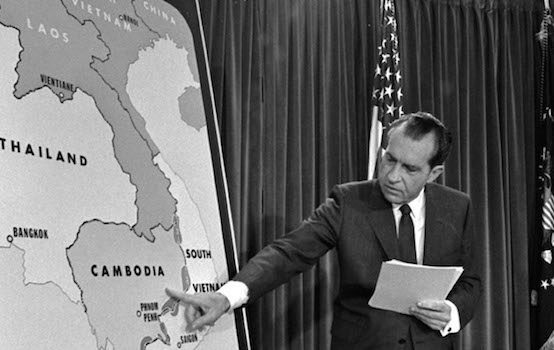by ANDREW J. BACEVICH

Inflammatory and hysterical language was used then, as it is now, to camouflage reality.
Forty-nine years ago, on the evening of April 30, 1970, President Richard Nixon appeared on television to address the nation. Although his administration was in the process of withdrawing U.S. forces from Vietnam, the purpose of Nixon’s presentation was to announce an expansion of the ongoing conflict. As he spoke, American and South Vietnamese (ARVN) combat units were crossing into Cambodia, a nominally neutral country that had long served as a de facto sanctuary and logistics base for the North Vietnamese Army (NVA).
Nixon framed his decision to invade Cambodia as an essential response to an existential threat. “My fellow Americans,” he announced, “we live in an age of anarchy, both abroad and at home.” The situation was dire, not simply (or even especially) in Southeast Asia, but domestically and globally. “We see mindless attacks,” he continued, “on all the great institutions which have been created by free civilizations in the last 500 years.” Within the United States itself, “great universities are being systematically destroyed” even as “small nations all over the world find themselves under attack from within and from without.”
Then came Nixon’s nut graf, in which the president scaled the Mount Everest of hyperbole: “If, when the chips are down, the world’s most powerful nation, the United States of America, acts like a pitiful, helpless giant, the forces of totalitarianism and anarchy will threaten free nations and free institutions throughout the world.” Take Nixon’s words at face value and the real mission of the troops entering Cambodia was to avert the collapse of civilization itself.
Most of this was nonsense, of course. By putting a big enough hurt on the NVA, the invasion of Cambodia might buy a bit more time for ARVN to prepare itself to fight without the assistance of U.S. ground troops. That was about the most that could be hoped for. Sadly, however, the operation failed to accomplish even that. After a few weeks, U.S. and ARVN forces withdrew back into South Vietnam. The NVA repaired the damage it had sustained. Overall, the Cambodia campaign proved irrelevant to the war’s ultimate outcome.
At home, meanwhile, Nixon’s decision touched off a wave of protests on campuses across the nation, culminating in the shooting of unarmed student protestors at Kent State University and Jackson State College. Offended at not having been consulted in advance about Nixon’s intentions, the Congress retaliated by rescinding the 1964 Tonkin Gulf Resolution that had first given the previous administration a green light to initiate combat operations in Vietnam. This was an empty gesture, however, which had no practical effect on the events unfolding on the ground.
Except perhaps among those former G.Is who participated, the Cambodian invasion has long since disappeared down the American memory hole. Yet even today in the so-called Age of Trump, I believe that it retains at least modest significance. If nothing else, it offers an instructive example of how wildly inflammatory language serves to camouflage reality and to incite and divide rather than to inform and unify.
The nation is today awash with inflammatory language that might make Nixon himself blush. Some of that language comes from President Trump and his supporters. As much or more emanates from the anti-Trump camp. On both sides, reason has seemingly taken flight. The hysterical tone of public discourse might suggest that totalitarianism, anarchy, and the collapse of Western civilization are lurking right around the corner.
The American Conservative for more
